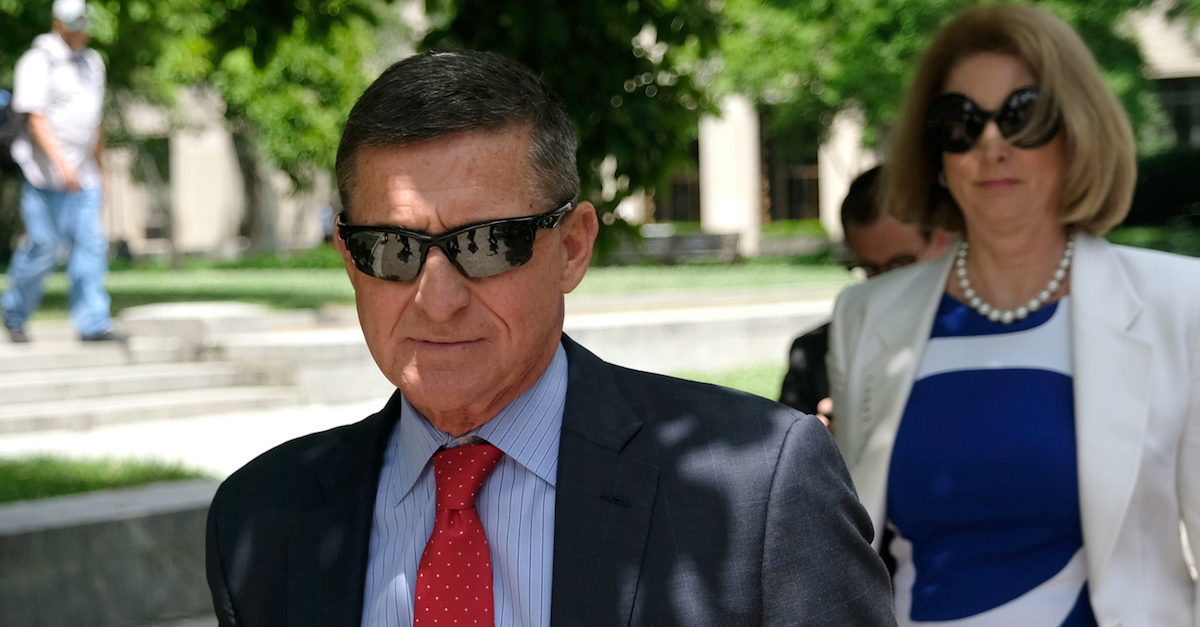
The government told a federal judge that it does not oppose former national security advisor Michael Flynn avoiding jail and being sentenced to probation in documents filed with the U.S. District Court for the District of Columbia on Wednesday. This is a stance that struck several former federal prosecutors as “odd” in light of recent events.
In a seven-page sentencing memo, the Justice Department said it “agrees with the defendant that a sentence of probation is reasonable,” marking a drastic shift in tone from prosecutors previous sentencing memo which urged the court to sentence Flynn to at least some time behind bars.
In their Jan. 7 sentencing memo, prosecutors said called Flynn’s case “unique,” saying that he had not accepted responsibility for his conduct. They said his offenses were more egregious than other former government officials who served time in prison for convictions on similar charges.
“[T]he government is not aware of any case where such a high-ranking official failed to accept responsibility for his conduct, continued to lie to the government, and took steps to impair a criminal prosecution,” they wrote, before comparing Flynn to former Trump campaign aides George Papadopoulos and Rick Gates, and former Director of Security for the Senate Select Committee on Intelligence James A. Wolfe–all of whom accepted responsibility for their crimes and were sentenced to time behind bars.
“The court concluded that Wolfe’s position–which was far less significant than the defendant’s position as National Security Advisor–was an aggravating factor to consider at sentencing, and one that distinguished his case from those of Papadopoulos and [Alex] van der Zwaan. Moreover, in that case the defendant received credit for accepting responsibility,” they wrote, noting that “in the above cases, a term of imprisonment was imposed.”
The sentencing memo on Wednesday took an opposing approach, however, comparing Flynn to former National Security Advisor Sandy Berger and General David Petraeus, both of whom received probationary sentences. Prosecutors also dedicated a significant portion of their filing to acknowledging Flynn’s lengthy military career, referring to his service as “an important mitigating factor for the Court to consider” when determining his sentence, and stating that he has displayed “an unusually strong record of public service.”
“Based on all of the relevant facts and for the foregoing reasons, the government submits that a sentence within the Guidelines range of 0 to 6 months of incarceration is appropriate and warranted in this case, agrees with the defendant that a sentence of probation is a reasonable sentence and does not oppose the imposition of a sentence of probation,” prosecutors concluded.
Former federal prosecutors Harry Litman and Renato Mariotti both remarked on the oddity of the DOJ’s reversal regarding Flynn’s sentence.
“This is odd, given the tone of the initial sentencing memorandum, noting that Flynn did not fully cooperate or accept responsibility for his criminal activity,” Mariotti wrote. “Did someone at DOJ get a call from the White House?”
“Really really odd,” Litman responded. “Congress needs to figure this one out.”
Others suggested there was something untoward afoot.
Also on Wednesday, Flynn’s lead defense attorney Sidney Powell submitted court documents accusing Flynn’s previous legal representation of having “intractable conflicts of interest” which “severely prejudiced him” until he retained new counsel. Powell already submitted a motion to withdraw Flynn’s guilty plea which is still under consideration by U.S. District Court Judge Emmet Sullivan.
Flynn’s sentencing hearing is currently scheduled for Feb. 27.
Read the DOJs full sentencing memo below:
DOJ Sentencing Memo Reply by Law&Crime on Scribd
[image via Alex Wroblewski/Getty Images)